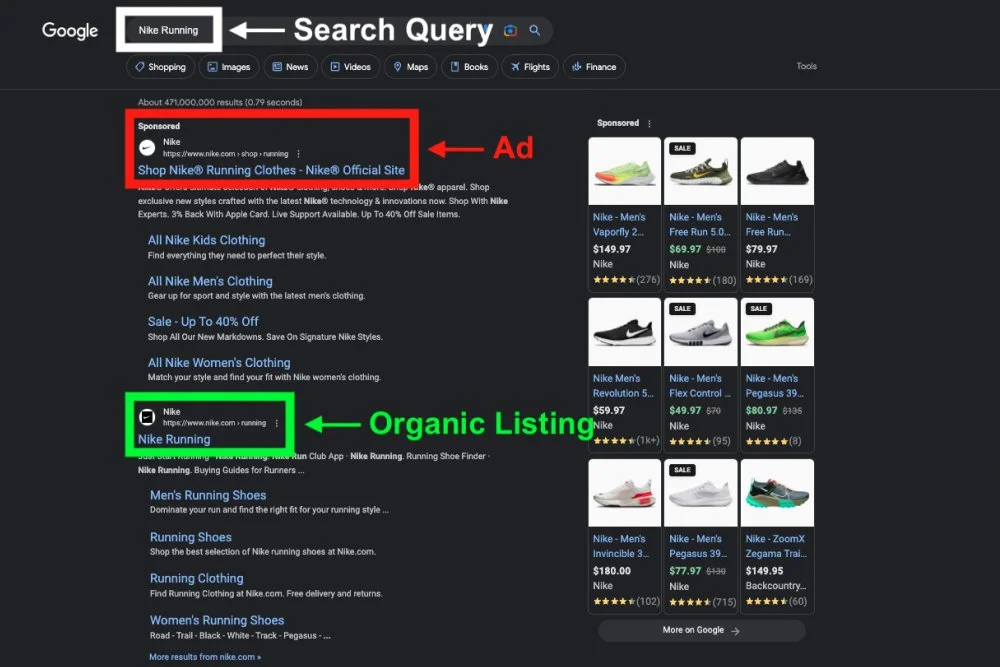Brand Terms I: What Are They and When Should You Run Campaigns for Them?
By Joe Kim, Founder of Frontside Consulting
In the world of digital marketing, the term "brand term" is often used to refer to the name of your brand or organization (and other brand-related phrases) as a search query. But when should you run a brand term campaign? The answer is not always straightforward. In this blog, we will define brand terms and discuss their intricacies, when to run brand term campaigns, and why attribution is crucial in understanding how to credit sales to marketing sources.
What are brand terms?
As a search marketer (or anyone working in the world of digital marketing), you need to be familiar with “brand terms." On the surface, brand terms are simple to define, they refer to the name of your brand or organization as a search query. To clearly demonstrate this, let’s use as an example one of the most recognizable brands in the world, Nike. If you are on Nike’s (no doubt massive) digital ads team and are driving traffic to Nike.com, then "Nike,” and related queries like “Nike shoes,” “Nike apparel,” etc… are examples of your brand terms.
The click-through rate (CTR) on Nike.com when someone searches for "Nike" is probably astronomical, and when you've captured the mind space of users searching for a given term, it acts like a brand term. For example, Nike may have a keyword in its ad campaigns with a CTR of over 35% like "white air force one shoes," which acts like a brand term (therefore, you can treat it as one).
Although there are subtleties here, let's keep it simple for now…
Should I run a brand term campaign?
Now, the question is, should you run a brand term campaign? On the surface, keywords with 35%+ CTR seem like a no-brainer, right? How could you not want to run a campaign driving clicks from those queries to your site? Well, when you have a multi-billion dollar corporation's financial interests in mind, you have to be a bit cautious…
The problem (and the primary situation you want to avoid) is when your paid ad serves directly above the organic search listing, as in this Nike Running example:
There are subtle differences between the copy and sitelinks on the two search results, but these kinds of queries are typically navigational in nature (meaning the user knows Nike Running, has likely visited the site before, and is simply trying to navigate back there). In these instances, when a mobile user doesn't feel like finishing out the Chrome browser search bar with ".com” (as they’re fumbling with a scalding vanilla latte, those extra four characters start to feel like a hassle) their thumbs are more than likely to poke the first relevant listing they come across. With that listing being Nike’s ad, that click just cost them $0.10. No big deal right? However, over time and with enough search query volume, those dimes add up to thousands upon thousands of ad dollars. Thus, you want to make sure that you avoid spending money on keywords and traffic that you'd be getting anyway.
So the question becomes - what would happen to that user’s journey had Nike’s brand campaign not run? Hard to say exactly, but my guess here is that they’d get the click through the organic listing and still make the sale.
When should I run brand term campaigns?
As we just discussed above, you want to avoid spending money on keywords and traffic that you’d be getting anyways. So, when do you want to start running brand term campaigns? The simple answer is: when you likely wouldn't be getting that traffic. Here are a few situations where that makes the case:
You're a new brand, domain, or organization that doesn't have an established search engine optimization (SEO) presence or low organic search ranking for your own brand name.
Competitors are running campaigns against your own brand terms.
You're a brand with third-party retailers or a retailer of a brand selling the same products or services.
You're highly promotional and can update for ad copy and drive traffic to parts of your website that are temporary and don't have time to get crawled, indexed, and ranked highly for SEO.
Attribution
If you’re a seasoned digital marketer, you probably already know of the term attribution, but if you’re new to digital marketing, you probably don’t. Simply put, attribution is the process and system of understanding how to credit sales (or other goal actions like leads, bookings, etc...) to their marketing sources. (i.e. Did a particular sale come through organic search, paid search, paid social, etc…)
What makes digital marketing so powerful is that the ability to track users through the purchasing funnel makes it possible to optimize the performance of, and create highly targeted and efficient campaigns. This is in contrast to the old “Mad Men” style of boardroom marketing where Nielsen ratings, Ouija boards, and the opinions of out-of-touch executives drove marketing decisions.
… but there are lies, damn lies, and statistics. Or in our case conversion tracking.
Search advertising platforms (like Google Ads and Microsoft Ads) and nearly all ad platforms are generally unaware of any user touchpoint outside of what's in their data set. So, in the case of the Nike Running query above, Google Ads only credits sales due to click-throughs of the brand term or other search, display, or YouTube Ads within the account. Meaning that Google Ads may credit a previous click on “Nike Running” or a display network campaign, but would be oblivious if the brand term query was driven by an effective Facebook Ad or Pinterest Ad campaign. They certainly don’t take into account the opportunity cost of letting the user get to the Nike Running site by a free organic listing.
Key Takeaways
We covered a lot in a few paragraphs, here are some important things to remember pertaining to brand terms:
The reported high performance of brand terms shown in the ad platform needs to be taken with a sizable grain of salt.
Opportunity cost is what’s at stake with brand terms.
If it looks like, acts like, or smells like a brand term, it’s probably a brand term.
If your SEO isn’t great, brand terms can pinch-hit until it is.
Not all brand terms are created equal. There are times when it makes sense to run them. Just don’t take your Google Sales Team’s… err, I mean “Account Representative’s” word for it.
Sound complicated? It is. But don’t fret, we’re here to guide you! Get in touch with us and we’ll help you navigate the complexities of paid digital marketing.
As always, give us a follow on social and sign up for our newsletter below to keep abreast of more great digital marketing and small business content.


